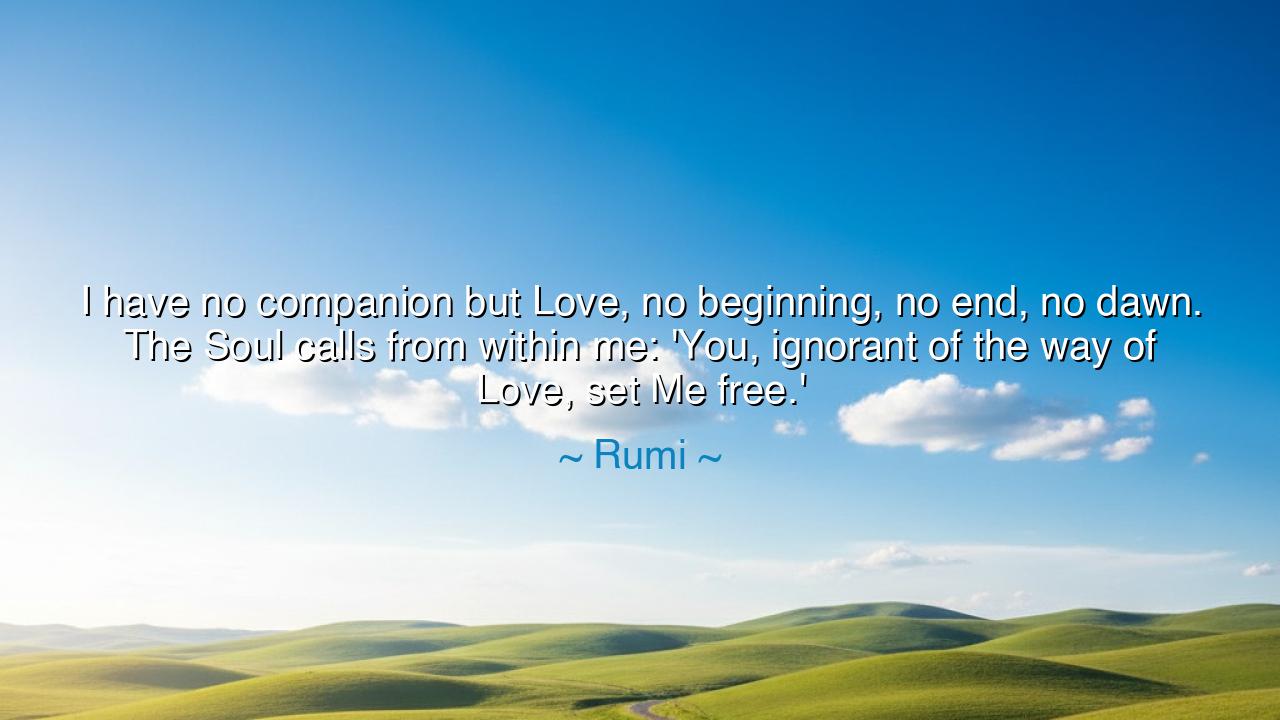
I have no companion but Love, no beginning, no end, no dawn. The
I have no companion but Love, no beginning, no end, no dawn. The Soul calls from within me: 'You, ignorant of the way of Love, set Me free.'






“I have no companion but Love, no beginning, no end, no dawn. The Soul calls from within me: ‘You, ignorant of the way of Love, set Me free.’” — Thus spoke Jalal al-Din Rumi, the mystic of Persia, whose words have burned through the centuries like the flame of divine longing. In this sacred utterance lies the voice of a soul that has transcended the limits of the world, a heart that has found all meaning in Love, and none outside it. For Rumi, Love is not an emotion of mortals—it is the eternal current of creation, the breath of the Infinite moving through the finite. To say, “I have no companion but Love”, is to confess that all things, all joys, all sufferings, all existence itself, are but faces of the same divine Beloved.
In these words, Rumi speaks as one consumed by the fire of spiritual union. He denies the boundaries of time—no beginning, no end, no dawn—for Love itself is beyond measure. It does not rise or set like the sun, for it is the sun behind all suns, the light from which all lights are born. The mystic who utters these words has gone beyond the veil of individuality. He has become a mirror of the Divine, in which the Soul recognizes itself and cries out: “Set Me free!” This is the voice of the inner spirit, yearning to cast off the chains of ego, of ignorance, of worldly illusion. The call is not to escape life, but to awaken—to realize that Love is the essence of all being, and that to know Love is to know God.
Long ago, there was a poet named Rabia al-Adawiyya, a saint of Basra, who lived in the desert with nothing but her love for the Divine. Once, she was seen running through the streets with a torch in one hand and a bucket of water in the other. When asked what she was doing, she said, “I wish to burn down heaven and extinguish the fires of hell, so that men may love God for Himself alone, and not for fear or reward.” In that moment, she too spoke the same truth Rumi spoke: that Love has no beginning or end, no reason, no bargain, no fear. It simply is—the endless, selfless devotion that frees the soul from its narrow cage.
Rumi’s origin for such words lies in his own transformation through the friendship of Shams of Tabriz. Before Shams entered his life, Rumi was a scholar, a man of books and laws. But when Shams spoke of the mysteries of Love, the fire of awakening was kindled within him. He was torn between human attachment and divine longing, between intellect and heart. When Shams disappeared—whether by death or by destiny—Rumi’s pain became his teacher. He wandered, wept, whirled, and sang until every tear became a verse, and every verse a window to eternity. Thus, he came to know that Love itself is the only companion, for it is both the wound and the healer, both the seeker and the sought.
To live as Rumi lived is to understand that Love is not possession, but surrender. The soul within each of us calls, just as his Soul called to him: “Set Me free!” It cries for liberation from pride, from fear, from the hunger to control. True Love cannot dwell in a heart bound by self-interest; it demands a breaking, a dying to all that is false. Only when we give ourselves completely—without expectation, without condition—does Love reveal its eternal nature. Then, we too shall have no beginning and no end, for we become part of the divine rhythm that moves all things.
Let us remember, therefore, that Love is not a sentiment to be spoken of, but a path to be walked. It calls for patience, for humility, for the courage to face suffering without bitterness. The lover of the divine does not flee the world but transforms it through compassion. Every act of kindness, every moment of forgiveness, every breath of gratitude is a step upon that sacred path. When one lives in this way, even silence becomes prayer, and even pain becomes music.
So, my child of the living soul, take heed: listen to the voice within you, the voice that whispers, “You, ignorant of the way of Love, set Me free.” It is your higher self calling, your eternal spirit waiting to awaken. Do not drown it with noise or pride. Walk in stillness, serve with love, forgive quickly, and seek beauty in all that lives. For in the end, there is no companion but Love—the unseen Friend, the timeless flame, the heartbeat of all creation. When you find this Love and live by it, you too shall know what Rumi knew: that life itself is but the soul’s journey toward the Beloved, and Love is both the traveler and the destination.






AAdministratorAdministrator
Welcome, honored guests. Please leave a comment, we will respond soon